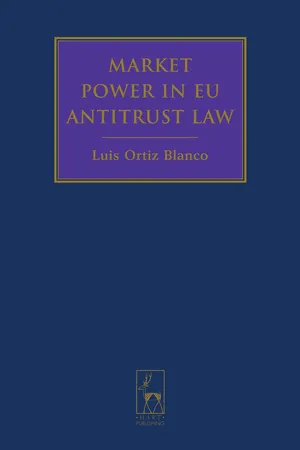
- 368 pages
- English
- PDF
- Available on iOS & Android
Market Power in EU Antitrust Law
About this book
The notion of market power is central to antitrust law. Under EU law, antitrust rules refer to appreciable restrictions of competition (Article 101(1) Treaty on the Functioning of the European Union (TFEU), ex Article 81(1) EC Treaty), the elimination of competition for a substantial part of the market (Article 101 (3) TFEU, ex Article (81(3) EC), dominant positions (Article 10 (2) TFEU, ex Article 82 EC), and substantial impediment to effective competition, in particular by creating or reinforcing a dominant position (Article 2 of the EU Merger Regulation). At first sight, only the concept of dominant position relates to market power, but it is the aim of this book to demonstrate that the other concepts are directly linked to the notion of market power. This is done by reference to the case law of the EU Courts and the precedents of the European Commission. The author goes on to argue that for very good reasons (clarity and enforceability, among others) the rules should be interpreted in this way. Beginning with market definition, the book reviews the different rules and the different degrees of market power they incorporate. Thus it analyses the notion of 'appreciable restriction of competition' to find a moderate market power obtained by agreement among competitors to be the benchmark for the application of Article 101 TFEU, ex Article 81 EC. It moves on to the concept of dominance under Article 102 TFEU (ex Article 82 EC), which is equivalent to substantial (or sgnificant) market power, and then focuses on the old and new tests for EU merger control. Finally, it addresses the idea of elimination of competition in respect of a substantial part of the market (Article 101 (3) TFEU, ex Article 81 (3) (b) EC), in which the last two types of market power (Article 102 TFEU, ex Article 82 EC and EU Merger Regulation) converge. To exemplify this, an in-depth study of the notion of collective dominance is conducted. The book concludes that a paradigm of market power exists under the EU antitrust rules that both fits with past practice and provides for a useful framework of analysis for the general application of the rules by administrative and even more importantly judicial authorities in the Member States, under conditions of legal certainty.
Frequently asked questions
- Essential is ideal for learners and professionals who enjoy exploring a wide range of subjects. Access the Essential Library with 800,000+ trusted titles and best-sellers across business, personal growth, and the humanities. Includes unlimited reading time and Standard Read Aloud voice.
- Complete: Perfect for advanced learners and researchers needing full, unrestricted access. Unlock 1.4M+ books across hundreds of subjects, including academic and specialized titles. The Complete Plan also includes advanced features like Premium Read Aloud and Research Assistant.
Please note we cannot support devices running on iOS 13 and Android 7 or earlier. Learn more about using the app.
Information

Table of contents
- Cover
- Prelims
- Preface
- Contents
- Table of Cases
- Table of Legislation
- 1. Defining the Relevant Market in European Competition Law
- 2. Economic Power under Article 101(1) TFEU: Quantitative Evaluation of the 'Appreciable' Nature of a Restriction on Competition and Trade between Memeber States
- 3. Economic Power under Article 102 TFEU: Establishment of Dominant Position
- 4. Economic Power in the European Merger Regulation: Significant Impediment to Effective Competition, in Particular as the Result of the Creation or Strengthening of a Dominant Position
- 5. Economic Power under Article 101(3)(b) TFEU: The Condition of Not Eliminating Competition in Respect of a Substantial Part of the Market
- 6. Assessment of Economic Power under Article 101(3)(b)(II)
- 7. Collective Dominant Position in General
- 8. Oligopolistic Interdependence and Dominant Oligopolistic Position in Relation to Articles 101 and 102 TFEU and Regulation 139/2004 (I)
- 9. Oligopolistic Interdependence and Dominant Oligopolistic Position in Relation to Articles 101 and 102 TFEU and Regulation 139/2004 (II)
- 10. Expressly Collusive or Pure Collusive Dominant Position in European Competition Law
- Epilogue: A Paradigm of Market Power in EU Competition Law
- Bibliography
- Index